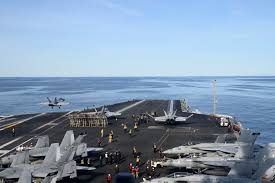United States President Donald Trump's recent statements regarding the situation in Venezuela appear to contradict his earlier remarks, raising questions about the U.S. military build-up in the region. Trump denied considering strikes within Venezuela, despite reports suggesting otherwise. The U.S. has bolstered its military presence by deploying fighter jets, warships, and thousands of troops to the Caribbean, with the aircraft carrier USS Gerald R Ford steaming towards the Venezuelan coast, marking a significant escalation.
In response to media inquiries, Trump unequivocally stated on Air Force One that there were no plans for strikes within Venezuela. This stance contrasts with his previous comments where he hinted at taking aggressive actions against individuals involved in drug trafficking. The U.S. military's recent operations in the Caribbean, primarily targeting alleged drug smugglers, have resulted in casualties and destruction.
The lack of transparency and evidence backing these operations has drawn criticism. The United Nations High Commissioner for Human Rights condemned the attacks, highlighting the need to prevent extrajudicial killings. These actions have raised concerns among Americans, with a recent poll indicating a decline in approval for the naval deployment near Venezuela.
Venezuelan President Nicolas Maduro has vehemently denied the U.S. accusations and criticized their military posturing as the fabrication of a perpetual conflict. Maduro's assertion that Venezuela does not produce cocaine runs counter to U.S. claims. The neighboring country of Trinidad and Tobago has reacted to the escalating tensions by placing its military on high alert and recalling personnel.
Moreover, the U.S. Senate Armed Services Committee's bipartisan members have expressed frustration over the lack of clarity regarding the legal justifications for the military actions in the Caribbean. Senator Roger Wicker and Senator Jack Reed, representing both parties, have issued requests for information that remain unaddressed by the U.S. Defense Secretary, highlighting a concerning lack of transparency within the government.
Overall, the evolving situation in Venezuela and the U.S. military's actions in the region underscore a complex and contentious geopolitical landscape. The absence of concrete evidence supporting the military operations, coupled with diplomatic tensions and conflicting statements, raises questions about the motives and potential consequences of the U.S. involvement in the region. The international community closely watches as developments unfold in this volatile and uncertain environment.

